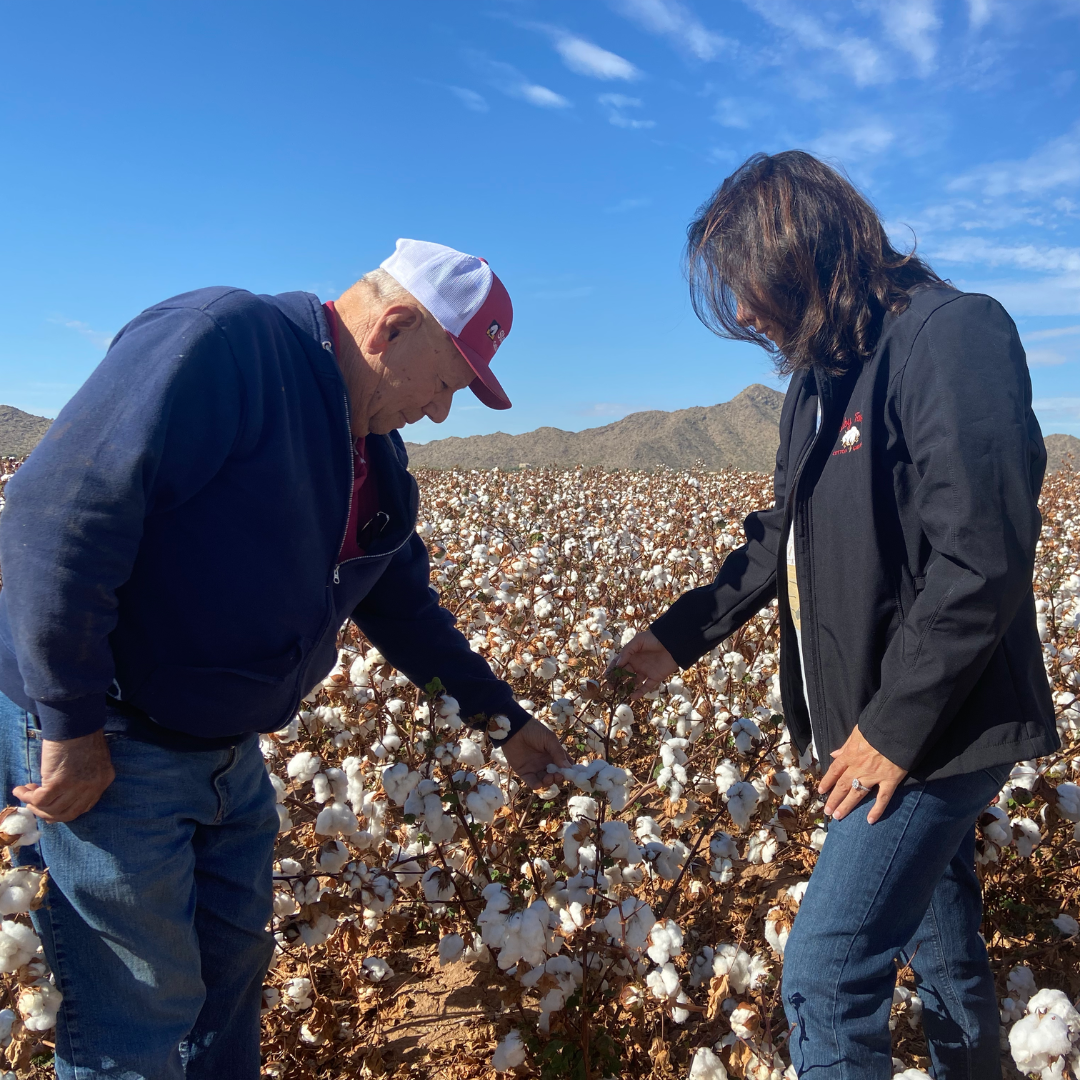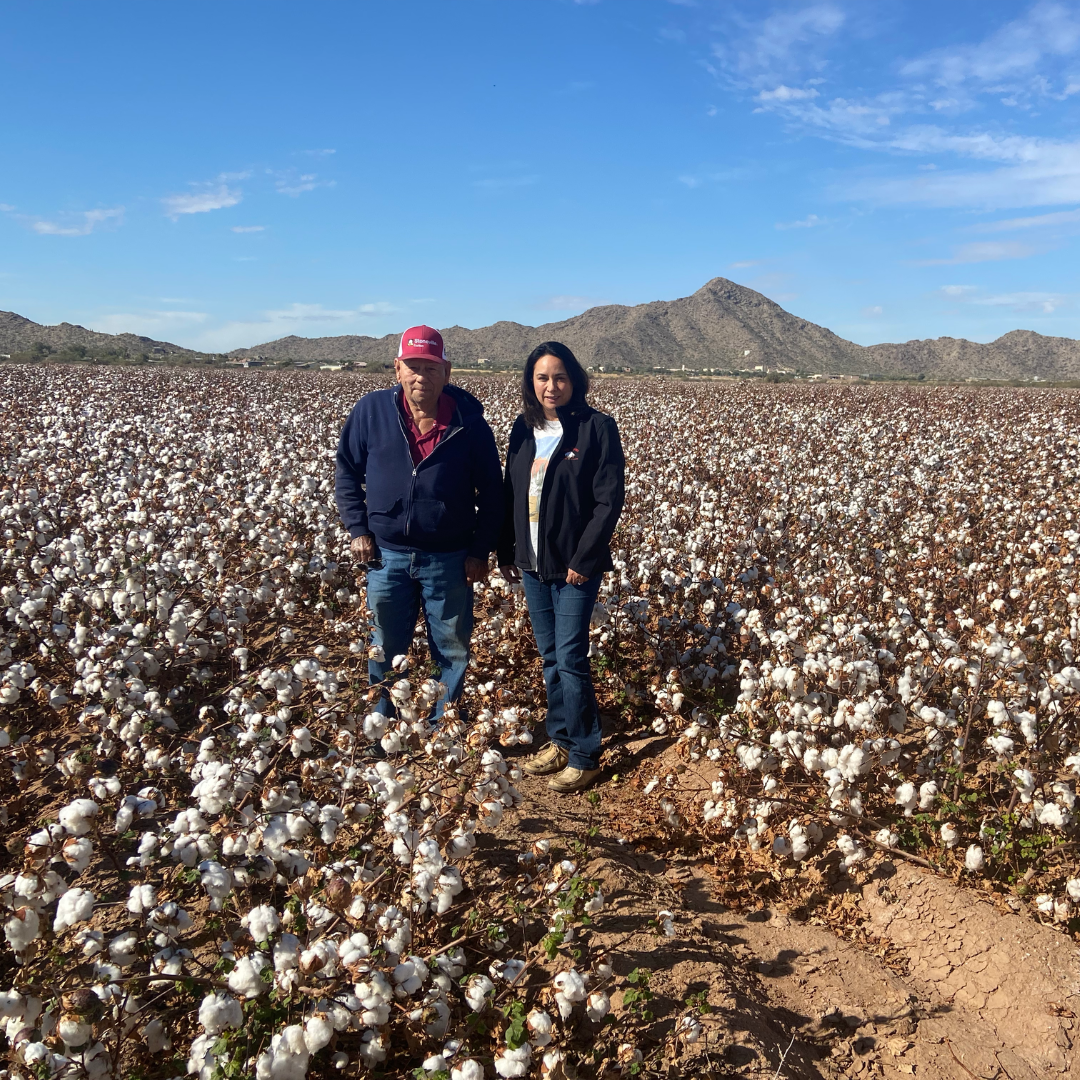Meet Arizona Agriculture’s Diwan Family
Author
Published
11/28/2023
Like all Pinal County cotton farmers, I’ve always admired the Diwan family’s cotton fields. Great cotton farmers love their cotton fields, especially when we can cite “a good cotton crop.” Plus, we love checking out the neighboring cotton fields.
The cotton season is just plain fun. Like DeAnna Diwan, featured in this profile article, said on the Rosie on the House radio show, the cotton harvest season is “like Christmas.”
Arizona’s Rosie on the House recently hosted Diwan for the November 2023 cotton feature. She gave great insights into her family history, cotton farming, and the love of farming in general.
A family friend encouraged DeAnna to farm despite the fact she didn’t think it was her first choice. “You know everything about any crop we go by,” said her friend, Bronwyn Brooks Wolf. In fact, this realization helped DeAnna recognize that agriculture is her passion.
So, it only makes sense that we’d ask her to answer our regular profile questions for our ongoing series.
A cotton farming profile of DeAnna Diwan and her family, from Pinal County.
An ongoing series of our farm, ranch, and agribusiness families.

Dad and daughter inspecting the cotton crop.
Tell us about your family’s history, specifically the farming history: Our farming history starts in Puerto Rico. My great-grandfather Herman’s family had a Spanish land grant there. Like many family farm stories, too many family members existed to support the small farm, and someone had to leave. Great Grandpa Herman, my grandfather’s father, saw an ad by Arizona Cotton Growers seeking workers. He packed up his wife and four children and set sail on a troop ship called SS Munorleans to Galveston, Texas.
It was 1926 when they arrived in Arizona, life was tough. My grandfather’s mother died of typhoid fever. His father left to seek work in Phoenix leaving my grandfather with his former employer Diwan Singh. It was years later that my grandfather learned the fate of his father and siblings. His father had passed away from pneumonia; his siblings were adopted and sent to an orphanage and his older brother mainly survived on the streets. Both his parents had died within a year of coming to America.
His adopted father Diwan Singh was a Sikh from Punjab, India. He was a hard worker who was known to lease land that others could not turn a profit on. He was an early adopter of innovative farming practices such as transitioning from horse to tractors, using sump pumps to reduce water waste and improve irrigation efficiency, and implementing tough tillage practices to let the land aerate promoting better water drainage, root development, and overall soil structure. In the 1950s, he farmed more than 12,000 acres in the Casa Grande and Picacho area.
My grandfather Herman made his fortune during 1941-42. Diwan Singh had been helping him lease a couple of farms in the La Palma area. His budget for cotton that year was nine cents. After war was declared the government froze cotton at 42 cents. He took that money and bought better ground. The rest, as they say, is history. We still farm that land today. It is one of the most productive cotton lands in the county, with a historical average of over 1,800 pounds per acre. It is what we call black land because of the clay content, a Mohall soil with some sandy places.
Tell us about your agriculture operation in Pinal County: Ruby Farms is the name of our farm. This farming entity was established in 1986. The name Ruby comes from my grandmother and now my daughter carries on her name. I started farming in 1999. My grandparents were doing some estate planning, and we needed someone else on the farm. I don’t believe my dad ever thought I would be involved in the day-to-day operation as much as I am now. My father and I are partners on the farm. We grow cotton, alfalfa, corn silage, barley, and durum wheat. But, as our farm logo says, we’re cotton growers. Everything else is done to build up the soil and help with cash flow. We farm around 1,000 acres, some of which have been in the family since the 1940s. All our farmland is owned by the family.
I find myself telling people that family business is like the mob. Once you’re in there is no going back! Farming and agriculture were never going to be my life. My grandfather once told my father that farming was not going to be around forever. Now I know better. Farming will always be around. It is just going to look a little different.
You are also a professor. Talk about this. I am a professor of Agriculture at Central Arizona College. It wasn’t a job I ever thought I would do. Like most things, I stumbled into it. I had a friend contact me and ask if I would be interested. I had almost forgotten I had my master’s degree! It took me a while to warm up to the idea, but I’m so glad I did. I love sharing my love for agriculture with students from all types of backgrounds.
When you reflect on your childhood, what are some things that stick out most in relation to agriculture? The slamming of the door at 4:30 in the morning on a summer’s day. That sound still brings fear to me and my siblings. It means Dad has gotten back from checking the farms and we should be up and ready to work. It’s crazy to think that we used to hoe all the rows and use spray rigs. So many memories. I taught so many friends how to drive before I was in 8th grade. One of my jobs was to help move manual irrigator trucks from one farm to the other, which was about 10 miles away starting around the age of 10. I would get so scared at stop signs and pop the clutch so I would not roll back or stall in the middle of the road.
Through the years or months, what’s been most important to you about the family business and why? Continuing to farm! Making the best decisions we can with the information we have. I’m extremely proud to be a 4th generation Arizona farmer and I hope someday to have my daughter be the 5th generation to work the land that’s been in my family for almost 100 years. There have been a lot of family members that worked unbelievably hard for me to be here, I just want to honor their sacrifices.
What do you love the most about the agriculture industry? The people. They are hardworking and community-oriented. Our cotton picker broke down a couple of years ago with two days left of picking. Our neighbors, the Martins, brought their picker over to finish up and we have done the same for them. Farmers take care of each other.
What are some ways you stay active in your community? I serve on the River COOP Gin, Hohokam Irrigation District, and ED2 Electrical Board. I’ve never asked but I believe I’m the first woman to serve on these boards. Central Arizona College hosts the Dean Merrill FFA Field Day. I get to meet the local teachers and students. It is a fun day celebrating an agriculture legend in Pinal County.
What’s been the most pleasantly surprising aspect of your agriculture business? Getting to work with my father. Doing business with family is hard but also very rewarding. When we lose, we get to do it together and when we win, we get to do it together. We don’t always agree. Even when our Puerto Rican tempers get the better of us, we are carrying on a family tradition! There have been some pretty entertaining ones in the last 20 years.

Fred Diwan, with his daughter, DeAnna, is a "Boots-on-the-ground farmer and known for his quality cotton.
What’s been most challenging? Getting the people who make the decisions on water, electricity, and government entities to understand that food and fiber need to always be grown in the United States. If we stop growing it in one of the most productive counties (Pinal County) in the US, it is not just going to pop up in another state. As more generations get farther from the farm, there is a disconnect from their roots. We must bridge that, while also being considerate of the emotions that go into what families put on their tables to eat and what clothes they put on their backs. I tell my ag students that as they maneuver through life they are going to be asked many questions about modern agriculture. They need to keep up with new practices and be able to speak knowledgeably about a wide variety of agriculture issues. People are curious about what we do and when there is curiosity there is a chance to teach them.
What is one fact or achievement that few people know about you? I’m a useless information and history buff. I love it. I’ve read a library’s worth of books. To this day whenever I have free time, I’m either reading or listening to audio books! I always wanted to be the lifeline call on the show Who Wants to be a Millionaire.
In your opinion, how will the next generation of agriculturalists need to operate to be successful, especially in the agri-business space? Especially talk about how you mentioned your family will always own land. They will have to learn to do more with less. You need to figure out what’s important to you. For me, it’s being a steward of the land. I would love to be able to grow old on the same farm I grew up on and pass it down to my daughter. But to be able to achieve that goal when we are down to 400 acres is probably going to require thinking outside of the box. It will most likely look different. Agritourism, wedding venues, restaurants, and more will probably have to be a part of it. The one objective that we have is to keep the land in the family as long as we can. I feel that growing up on the farm was a gift and I want to give that childhood to my daughter.
What is the best life advice that you have received? Sign your own checks. It seems simple but what it really means is knowing exactly where your money is going. Do not delegate that responsibility. Too many times, over the years, good, honest people lose everything because they let others handle their finances and sign the checks. Nobody will care for your family, your future, and your business more than you.